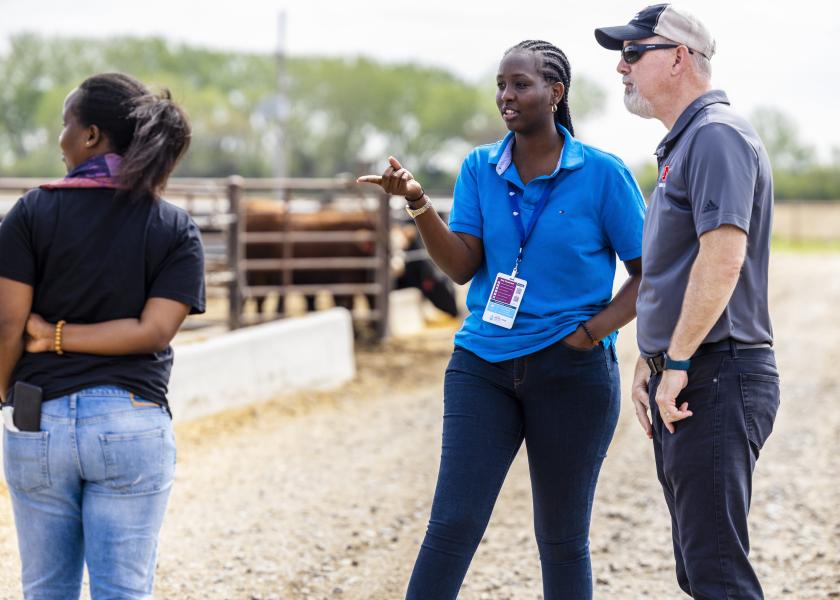Delegation Tours Nebraska as Part of Water for Food Global Conference

A diverse delegation from at least nine different countries recently had the opportunity to interact with Nebraska agriculture firsthand as part of the Water for Food Global Conference.
The Daugherty Water for Food Global Institute at the University of Nebraska hosted the conference May 8-11 in Lincoln, Neb. and brought together those from academia and research, the private sector, non-governmental organizations and non-profits, policymakers and growers from around the world to focus on solutions for food and water security. Touting Nebraska as the perfect destination for such a conference due to its rich agricultural landscape, cherished water resources, and world-class university research, the institute also showcased the state outside of the conference room by hosting a farm and feedlot tour.
After three days of discussing solutions for food and water security, nearly 30 attendees stayed an extra day to visit Nebraska producers and learn about the innovation and technology in the state. Attendees represented the Democratic Republic of the Congo, Ethiopia, India, Indonesia, Italy, Japan, Peru and Rwanda, as well as the United States. In collaboration with the Nebraska Corn Board, the Nebraska Soybean Board, and the Nebraska Cattlemen Foundation, the group toured Weber & Sons Feedlot in Dorchester, as well as Allan Tiemann’s row crop farm in Seward.
The group varied in background, from a wheat breeder in the U.S., a crop specialist in Peru to a meteorologist in India. At Weber & Sons Feedyard, they met with owner/operator Joel Weber and University of Nebraska - Lincoln professor of animal science Galen Erickson, who shared the intertwining factors of animal care, sustainability, water and nitrogen management, and economic margins that are taken into account within a Nebraska feedlot operation.
At Alan Tiemann’s row crop farm, attendees viewed a combine and planter up close and talked with Jennifer Swanson, liaison for the Nebraska Association of Resource Districts, about Nebraska’s unique water management and how nitrates are being addressed across the state.
A panel of three area farmers also spoke with the group, including Alan Tiemann, a Seward farmer, former Nebraska Corn Board member and former chairman of the US Grains Council; Jason Lewis, Nebraska Corn Growers Association board member and co-chair for the research and stewardship committee for Nebraska Corn; and Ruth Ready, Scribner farmer, livestock producer, and District 3 director and Community Engagement Committee chair for the Nebraska Soybean Board.
“This group of people from all over the world is engaged in working toward solutions for food security and water management,” said Arianna Elnes, communications specialist for the Daugherty Water for Food Global Institute. “As a result of the event, they came away with impactful new insights into a farmer's inputs and challenges; where there are shortages and where modernization has given a necessary edge. This was a great opportunity to share the great collaborative efforts, commitment, and innovations here in Nebraska. It’s one thing to talk about it, but it’s another thing entirely to see it in the field.”
“From nutrient management to Natural Resources Districts, we have unique solutions to meet our water and agricultural challenges in the state that can applied to similar challenges in other parts of the world. To see that in person, and at scale, is a wow factor for many,” said Elnes. “At the same time, it’s validating to see that though we are from all different parts of the world, we are all working toward the same things, and share the same goals.”
About the Daugherty Water for Food Global Institute
The Daugherty Water for Food Global Institute at the University of Nebraska was founded in 2010 to address the global challenge of achieving food security with less stress on water resources by conducting scientific and policy research, using the results to inform and advise policymakers, and educating future water for food leaders. Learn more at waterforfood.nebraska.edu.







